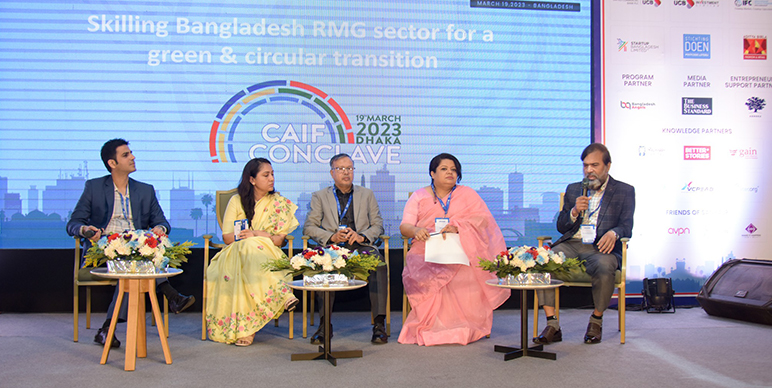Skill Up: Empowering Bangladesh’s RMG workforce for a Sustainable Future
Bangladesh, a powerhouse in the ready-made garment (RMG) manufacturing sector, is poised to graduate from LDC status in 2026. As the country prepares to adapt to global macro-trends, it stares at both risks and opportunities, especially with respect to a green transition and the increased adoption of new and frontier technologies by businesses. According to the recent WEF Future of Jobs report, these factors will drive labor market disruptors globally.
To address these challenges, sector experts gathered at the CAIF Conclave, a part of the Sankalp Dhaka Summit held on 19th March this year, to engage in an action-oriented discussion on skilling within Bangladesh’s RMG sector and its implications for the workforce. The aim of the discussion was to explore the nature of technologies and skill requirements necessary to support the sector’s transition to more sustainable and circular practices.
Here is a snapshot of the key themes which emerged from the deliberations:
Standardized curriculum development and relevant training models:
Skill development programs in Bangladesh, both in the private and public sectors, are numerous, but they mostly operate independently of one another. Experts agree that standardizing skill-building curriculums is essential to prepare Bangladesh’s workforce for the future. Collaboration and coordination between the private sector and government agencies are crucial to ensure consistency in skill development programs and alignment with workforce needs. Retd. Wg. Cdr. Zaglul Hayder of RMG and Textile Industry Skills Council (RTISC) rightly pointed out that the skill-building curriculum should align with the evolving needs of the industry to fully leverage the existing demographic dividend of Bangladesh. He also emphasized the need for industry-based training (IBT) to instill the spirit of skill building in the workforce on factory floors. CAIF, which has been working on skill development initiatives through Project Oporajita, also recommends adaptive training delivery models such as the establishment of local training centers and master-craftsperson-based training as these variations would be more suitable for SME manufacturing units, which form the bulk of RMG manufacturing units.
A just transition within pragmatic business realities:
During the discussions, there was a broad acknowledgement that the skill development of Bangladesh’s workforce has not kept pace with the demands of the industry. This sentiment resonated with many participants. Ms. Ishrat Fatema of Swisscontact stressed on the importance of creating momentum to support the workforce with suitable capacity-building programs that go beyond the narrow focus of productivity enhancement. Furthermore, she underscored the importance of understanding the critical elements of the business ecosystem that contribute to increased productivity and revenue.
Empowering women in the RMG sector:
Ms. Rawnak Jahan from CARE Bangladesh underscored the significance of empowering women in the RMG sector through improved technical capacity, soft skills, career advancement opportunities, and workplace safety. She stated that there is a need for coordination among multiple government agencies to increase women’s participation and institutionalize the focus on skill building. H&M Foundation’s Project Oporajita, of which CAIF is a partner, was highlighted as a notable initiative during the discussions. The program has a clear objective of providing skill development opportunities to out-of-work women garment workers and equipping them for future roles in the circular economy. It recognizes the potential of these women to contribute to sustainable practices and offers them the necessary training and support to thrive in this evolving sector.





